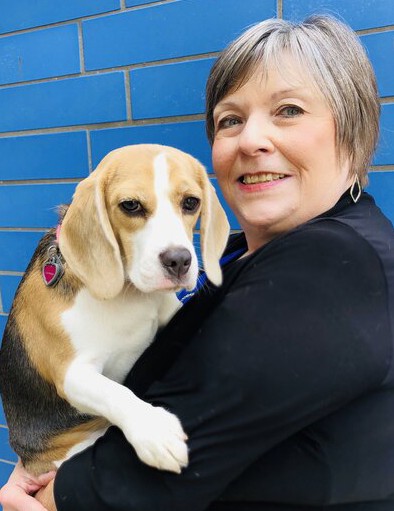Grief is relentless. The only way to get through grief is to grieve. The only way to get through the pain is to feel and process the pain.
One of the best ways to manage the stress and anxiety that often comes with bereavement is to understand grief. This is the reason we incorporate grief education in every one of our support groups and during our intake process.

Laurie Taylor with her grief therapy dog, Hope.
I can’t count the times a client has shared they are scared they are losing their mind. Their fear almost always is rooted in the difficulty they are experiencing with memory loss, lack of focus and the inability to organize. I can’t describe the relief they feel when they learn these three challenges are the natural byproducts of their grief.
When a loved one dies, they become the filter through which we view everything. Their death often makes it impossible for us to focus on anything else. We may feel as if we have separated from our bodies and part of us is floating above, completely unattached, but yet still a part of us. We are left going through the motions of planning final arrangements, mindlessly talking with others and feeling very much like a hologram — here, but not really here.
“We may feel we are trapped in another world and experience the confusing sensation of being present and being absent at the very same time.”
Our minds cannot fully process much of anything else, but at this point, not much of anything else really matters. The death of our loved one permeates every aspect of our lives. We have very little capacity at all to attend to other matters. We may feel we are trapped in another world and experience the confusing sensation of being present and being absent at the very same time.
We find difficulty remembering details and events and special dates that once were etched in our minds. Grief controls our brain, and the fog is all-consuming. We cannot focus on anything else other than the void that fills our heart and soul.
Even if we were master organizers in the past, we cannot coherently put one thought in front of another. We are floating and our feet cannot yet ground us back into reality and the full function of our memory, focus and organizational skills.
Some of our clients who have gone through chemotherapy and experienced “chemo brain” have shared that “grief brain” is very similar.
If you are experiencing “grief brain,” please know the challenges you face with memory, focus and organization are the big three deficits that often accompany grief. In due time, you will regain full use of each of these faculties. You are not losing your mind. I promise.
Laurie Taylor serves as executive director of the Grief and Loss Center of North Texas, based in Dallas.


